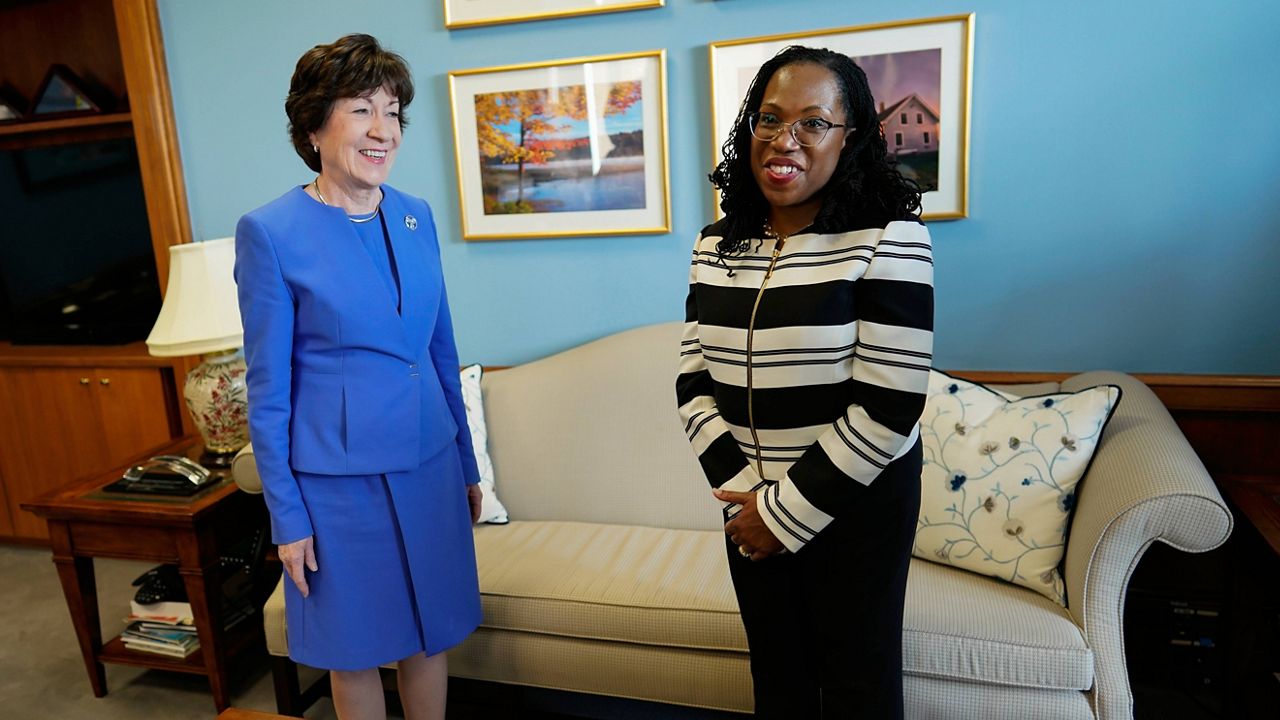Sen. Susan Collins on Wednesday became the first Republican to say she will vote to confirm Judge Ketanji Brown Jackson for the Supreme Court.
What You Need To Know
- Sen. Susan Collins on Wednesday became the first Republican to say she will vote to confirm Judge Ketanji Brown Jackson for the Supreme Court
- Collins’ support prevents the possibility of Jackson becoming just the second justice to be confirmed without bipartisan support and could avoid Vice President Kamala Harris casting the first tiebreaking vote in history
- Collins said she does not agree with all of the judge’s views, but added “that alone, however, is not disqualifying"
- Sen. Lindsey Graham of South Carolina, one of the three Republicans who supported Jackson's confirmation to the D.C. circuit last year, said he will vote against adding her to the Supreme Court, calling her an "evasive" witness during questioning
“After reviewing Judge Ketanji Brown Jackson’s extensive record, watching much of her hearing testimony, and meeting with her twice in person, I have concluded that she possesses the experience, qualifications, and integrity to serve as an Associate Justice on the Supreme Court,” Collins said in a statement.
In the 50-50 Senate, Jackson could have been confirmed without any Republican votes if Democrats stuck together. Collins’ support prevents the possibility of Jackson becoming just the second justice to be confirmed without bipartisan support — Amy Coney Barrett was the first in 2020 — and could avoid Vice President Kamala Harris casting the first tiebreaking vote in history in a Supreme Court confirmation.
To date, no Senate Democrats have said publicly they oppose President Joe Biden’s nominee. West Virginia Sen. Joe Manchin, a moderate Democrat who sometimes breaks with his party, announced his support for Jackson last week, all but sealing her confirmation in the evenly divided Senate. Manchin and fellow moderate Sen. Kyrsten Sinema, D-Ariz., have supported all of Biden's federal judiciary picks, including Jackson's confirmation last year.
Jackson sat through two days of sometimes bruising questioning during her Senate Judiciary Committee hearings last week. Republicans grilled her on what they characterized as her light sentencing in child pornography cases, her representation of Sept. 11 terror suspects as a public defender and critical race theory.
Jackson called child pornography a “sickening and egregious crime,” but argued, in the internet age, current sentencing guidelines don’t adequately differentiate between the most serious and less serious offenders. She defended her work with Guantanamo Bay detainees, saying public defenders do not get to choose their cases and that every suspect is entitled to legal representation under the Constitution. And she insisted critical race theory does not intersect with her work as a judge.
Collins said she and Jackson discussed several issues raised in the hearings. The senator said she did not always agree with the judge’s views.
“That alone, however, is not disqualifying,” she said. “Indeed, that statement applies to all six Justices, nominated by both Republican and Democratic Presidents, whom I have voted to confirm.”
Collins said, based on recent Supreme Court confirmation hearings, “the process is broken.” She said the process has moved away from what she considers appropriate standards for evaluating a Supreme Court nominee.
“In my view, the role the Constitution clearly assigns to the Senate is to examine the experience, qualifications, and integrity of the nominee,” she said. “It is not to assess whether a nominee reflects the ideology of an individual Senator or would rule exactly as an individual Senator would want.”
Collins was one of three Republicans who voted in June to confirm Jackson to the U.S. Court of Appeals for the District of Columbia Circuit. On Thursday, one of those senators, Lindsey Graham of South Carolina, said he will vote against her confirmation to the Supreme Court, calling her an "evasive" witness during questioning.
“I will oppose her and I will vote no," Graham said Thursday morning, signaling that Jackson will likely not receive any Republican votes when the Senate Judiciary Committee meets next week.
"I find Judge Jackson to be a person of exceptionally good character, respected by her peers, and someone who has worked hard to achieve her position," Graham said. "However, her record is overwhelming in its lack of a steady judicial philosophy and a tendency to achieve outcomes in spite of what the law require or common sense will dictate."
"My decision is based upon her record of judicial activism, flawed sentencing methodology regarding child pornography cases, and a belief that Judge Jackson will not be deterred by the plain meaning of the law when it comes to liberal causes," he added, echoing Republican lines of attack during her confirmation hearings.
A centrist Republican, Collins also voted in favor of both of former President Barack Obama’s picks — Sonya Sotomayor and Elena Kagan — and she opposed Donald Trump’s nomination of Barrett because the confirmation was held just prior to the presidential election.
The Judiciary Committee is scheduled to hold a vote on Jackson on Monday. If approved, her confirmation would then head to the full Senate.



